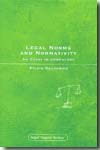Legal norms and normativity
an essay in genealogy
- ISBN: 9781841134550
- Editorial: Hart Publishing
- Fecha de la edición: 2006
- Lugar de la edición: Oxford. Reino Unido
- Colección: Legal Theory Today
- Encuadernación: Cartoné
- Medidas: 21 cm
- Nº Pág.: 218
- Idiomas: Inglés

The idea of a "legal norm" is traditionally associated with two characteristic features. On the one hand, legal norms purport to bind us, and they must be minimally successful in that endeavour if they are to exist as a "legal system". On the other hand, legal systems are social artifacts, and the legal norms composing them are made by men and women, according to the accidents of history. For most medieval philosophers the natural law model explained the apparent arbitrariness of law-making practices as being driven by a higher order of necessity (be it God's or Nature's) reflected in Natural Laws. Then, in the 16th Century, Montaigne questioned the natural law model by asking how law can have the authority it claims to have, and bind us, if it emerges from social practices whose sole necessity is to address the contingent needs and desires of a certain group of people, more or less representative of the rest of the population? This book offers a "genealogical" explanation of law's normativity. The term "genealogical" conveys a commitment to a non-metaphysical type of enquiry. While it seeks to explain how law, as a normative phenomenon, came about, it does not wish to ground law's normativity in anything but the context of social interaction giving rise to it. This "genealogical endeavour" differs from a reductive, or morally nihilistic enterprise (following Nietzsche) in that it builds on recent developments in ethical theory, attempting to make sense of the social contingency of moral values.






